Neuroscience
-
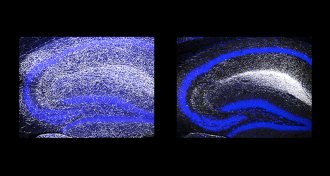 Neuroscience
NeuroscienceNerve cell miswiring linked to depression
A gene helps nerve cell axons extend to parts of the brain to deliver serotonin, a brain chemical associated with depression.
-
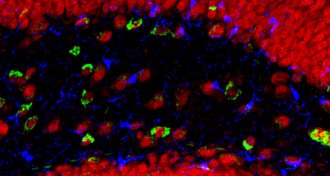 Neuroscience
NeuroscienceBrain gains seen in elderly mice injected with human umbilical cord plasma
Plasma from human umbilical cord blood refreshes aspects of learning and memory in mice.
-
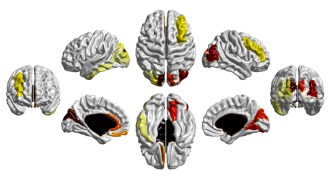 Humans
HumansScientists seek early signs of autism
The search for autism biomarkers, in the blood and the brain, is heating up.
-
 Neuroscience
NeuroscienceFood odors are more enticing to sleep-deprived brains
Sleep deprivation makes the brain more sensitive to food smells.
-
 Neuroscience
NeuroscienceMore brain differences seen between girls, boys with ADHD
ADHD looks different in the cerebellums of girls and boys with the condition.
-
 Neuroscience
NeuroscienceSarcasm looks the same in the brain whether it’s words or emoji
Sarcasm via winking emoji affects the brain like verbal irony does.
-
 Neuroscience
NeuroscienceMath-anxious brains tackle simple problems differently
An fMRI study found more variable brain activity in people who get nervous about math problems.
-
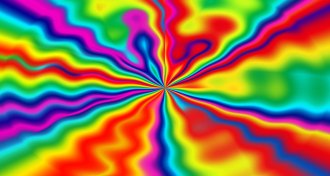 Genetics
GeneticsIn 1967, LSD was briefly labeled a breaker of chromosomes
Claims that the hallucinogenic drug damaged DNA were quickly rejected. But questions remain about how LSD works.
By Bruce Bower -
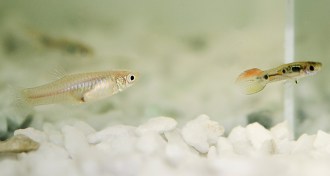 Animals
AnimalsFemale guppies with bigger brains pick more attractive guys
A larger-brained female guppy may pick primo males, but all that mental machinery costs her in other ways.
By Susan Milius -
 Neuroscience
NeuroscienceLab tests aren’t the answer for every science question
Acting Editor in Chief Elizabeth Quill discusses the value of observational science.
-
 Neuroscience
NeuroscienceSmartphones may be changing the way we think
We rely on our digital devices to connect with others and for memory and navigation shortcuts. What is that doing to our brains?
-
 Neuroscience
NeuroscienceMaking a mistake can put your brain on ‘pause’
When there’s not much time to recover, one error can lead to another.